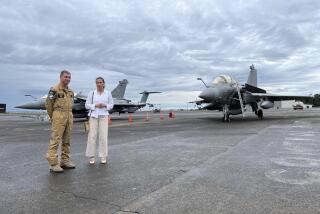Some Tough Duty in Manila
- Share via
The negotiations over extending U.S. base rights in the Philippines were expected to be hard. The opening round of talks proved them to be that, as well as testy.
Philippine Foreign Minister Raul Manglapus, hinting at nonrenewal of the bases agreement past September, 1991, decried the facilities as examples of “lingering colonialism.” Richard Armitage, the chief U.S. negotiator, adopted his own tough stance in anticipation of a Filipino demand for a big increase in aid as the price of extending the agreement. The United States, he warned, could abandon the facilities if Manila chooses to define its alliance with Washington only in terms of money.
The negotiating process, of course, is just beginning. But the preliminary talks accurately foreshadow the influences at work on the two sides. A rising mood of nationalism is pushing many in President Corazon Aquino’s government to consider the bases to be more of a liability now than an asset. At the same time a radically changed international environment makes the huge Subic Bay Naval Station and Clark Air Base less strategically important to the United States than they once were. President Bush has been blunt: The bases, he said the other day, are no longer essential to protect U.S. interests in the Pacific. Bush wasn’t talking about an American withdrawal from the region, but about finding alternatives to the Philippine sites.
A pullout would be expensive for both sides, though the long-term cost would fall most heavily on Manila. The bases employ 78,000 Filipinos. Directly and indirectly they contribute about $1 billion a year to the Philippine economy, a considerable sum in a country with a gross national product of only about $35 billion. It would be initially costly, but not prohibitive, for the United States to move to other facilities. U.S.-owned islands east of the Philippines, Guam or Tinian, for example, could replace Clark. Singapore has the facilities for the ship repair work now done at Subic Bay. The sites, in other words, are not indispensable.
Congress, facing a staggering budget deficit and impatient over Manila’s inability either to control the Communist-led insurgency or to achieve significant economic improvements, is in no mood to vote a major increase in compensation to the Philippines to keep the bases. As Armitage said, it’s up to the Philippines to decide whether it wants the U.S. military presence to remain and what value it places on the bases. The United States would like to hold on to the bases. Wisely and realistically, though, it is not showing any great sense of urgency about doing so. The base negotiations have a long way to run, but it may be that on the U.S. side at least, the bottom line has already been revealed.
More to Read
Sign up for Essential California
The most important California stories and recommendations in your inbox every morning.
You may occasionally receive promotional content from the Los Angeles Times.













